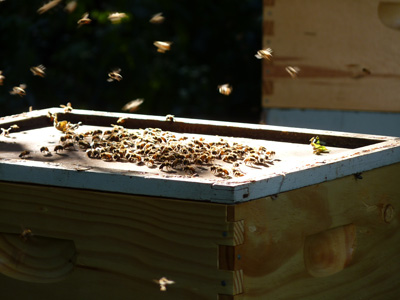Mid-Summer New Honey Extraction Moon
Kate and I bought a new vehicle yesterday, a Toyota Rav-4. Well, we picked out the things we wanted, left a deposit and now wait for the finding. This may not be big news in most families, but the last time we bought a new vehicle was 1999 and before that it was 1994. Until Wednesday we still had both of them. The Tundra, the 1999 purchase, fell thanks to an oil-pressure hose providing cooling to the transmission. It blew, taking with it other essential fluids, the engine and the transmission. Bad luck. The Celica motors on, at its next oil change it will hit 275,000 miles. Toyota’s last and that’s what I want, have always wanted, in a car.
Our life has coasted back to a familiar routine from the intense clay week followed by the intense family week. Both were good, positive experiences, but there are reasons these events last short periods of time and the calmer times last longer.
Got a note from Mary, safely back in Singapore, who observed that international travel was easier than intra-US. She had a variety of air-related mishaps in her two weeks plus of traveling the US by plane.
Kate and I need to spend time in our gardens, two weeks away from them at this time of year leaves weeds as happy as the plants we want  there. Also, the tomatoes have begun to ripen, peas have played out for now, though I’ll probably plant a fall crop, the beets have begun to fatten up (second planting), carrots, too. Chard and spinach look good and they, too, need replanting for fall harvest.
there. Also, the tomatoes have begun to ripen, peas have played out for now, though I’ll probably plant a fall crop, the beets have begun to fatten up (second planting), carrots, too. Chard and spinach look good and they, too, need replanting for fall harvest.
August will find us once again with the honey extractor set up, frames to uncap and jars to fill. Mark Odegard has begun work on the 2011 version of the Artemis Honey label. His first efforts looked good to me, but he’s a skilled professional and keeps adjusting, trying new things. We’ll try this year to uninvite the bees to the extracting party. They become a big bother, not appreciating the heist of their summer’s work. Who can blame them? Though, I should add, they put up a surplus well beyond what their winter survival requires. That’s why bee-keeping works in the first place.
